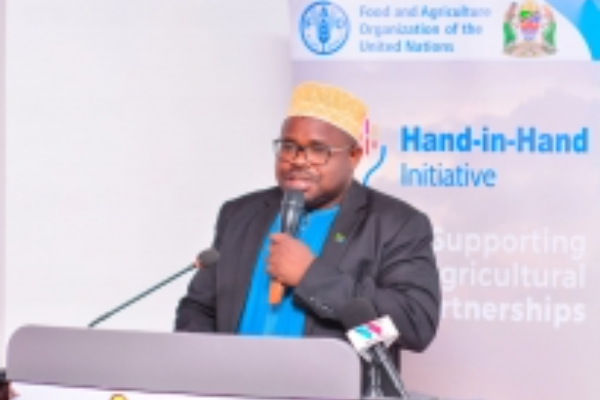
The Food and Agriculture Organization of the United Nations (FAO) has announced the extension of its Hand-in-Hand (HIH) Initiative to Zanzibar, targeting the fisheries and livestock sub-sectors.
This expansion aims to address key challenges facing these vital sectors and unlock their full potential for economic growth and poverty reduction.
“The Ministry appreciates FAO’s contribution in providing unique opportunities for investment in the dairy and seaweed value chains, which have a significant impact on raising the income of the people of Zanzibar and enhancing the country’s economy,” said Hon. Shamata Shaame Khamis, Minister of Ministry of Agriculture, Irrigation, Natural Resources and Livestock Zanzibar.
He further added that the eighth phase government, led by His Excellency the President of the Revolutionary Government of Zanzibar, Dr. Hussein Ali Mwinyi, is committed to enhancing cooperation with both development agencies and private organizations to increase investment in the agriculture sector.
Investing in agriculture in Zanzibar is crucial to the economy because it accounts for 70 percent of the population’s livelihood and development. From 2013 to 2022, the agriculture sector contributed 21 percent to 26 percent of the national income, with crop production accounting for 8.8 percent to 11.1 percent. Agriculture’s growth is driven by trade and export of goods, which accounts for 70 percent of all exported goods from 2013 to 2022.
The Ministry also recognized the role of Non-Governmental Organizations (NGOs) in accelerating development and engaging stakeholders from the private sector, academia, Civil Society Organizations (CSOs), and farmers to promote the agriculture sector in the country.
The Hand-in-Hand Initiative, launched in 2019, is a collaborative effort aimed at eradicating poverty, ending hunger, and reducing inequalities along agricultural value chains. By leveraging the Geospatial Platform, FAO provides crucial data support to enable governments, donors, and the private sector to target agricultural investments and policies effectively.
Charles Tulahi, Assistant FAO Representative and Head of Programme said: “Agriculture is a primary source of food and employment, particularly for youth and women but it faces a lot of challenges. FAO is committed to accelerating agrifood systems transformations through market-based approaches and data-driven interventions to address the challenges facing the agriculture sector.”
Responding to the request from the Revolutionary Government of Zanzibar, FAO is extending the Hand-in-Hand Initiative to address specific challenges in the fisheries and livestock sectors. Seaweed farming and dairy production have been identified as priority value chains due to their potential to empower communities, improve livelihoods, enhance food security, and contribute to economic growth.
Challenges currently facing the dairy and seaweed sub- sectors, include unsatisfactory income for seaweed farmers, particularly women, and untapped potential in both value chains. FAO’s expansion of the Hand-in-Hand Initiative aims to address these challenges through targeted interventions and investment opportunities.
As part of the Hand-in-Hand approach, FAO will collaborate closely with stakeholders to identify key investment cases and facilitate matchmaking opportunities for potential investors. The initiative aligns with Zanzibar’s priorities and complements ongoing efforts to achieve sustainable development and prosperity for all.
This collaborative effort comes ahead of the Hand-in-Hand Investment Forum scheduled to take place at the FAO Headquarters in Rome, Italy, from October 15 to 17, 2024. This forum will provide a platform to showcase compelling investment opportunities in Zanzibar’s fisheries and livestock sectors to potential investors, multilateral development banks, and other development partners.
FAO reaffirms its commitment to working hand in hand with the government, private sector, UN agencies, and development partners to support sustainable agrifood system transitions in Zanzibar. Together, we aim to realize a more resilient, equitable, and prosperous future for the people of Zanzibar.







